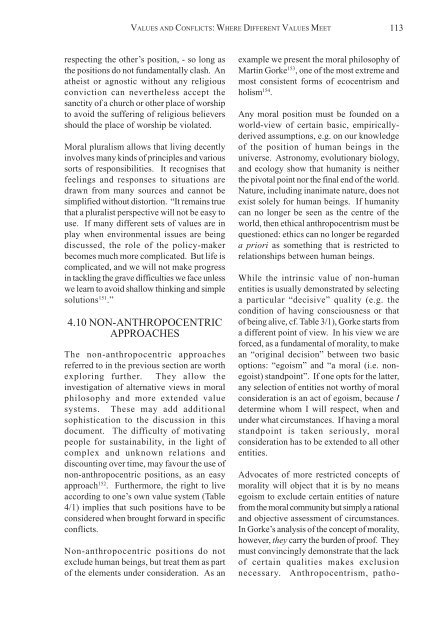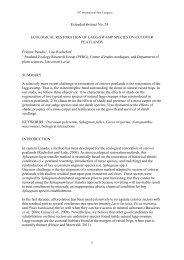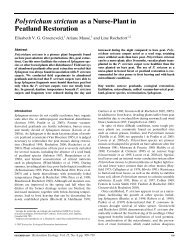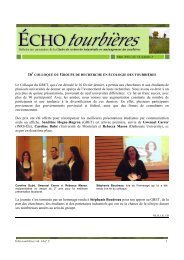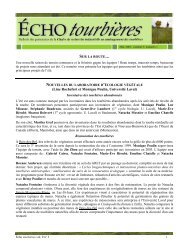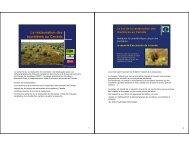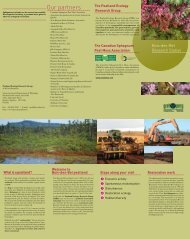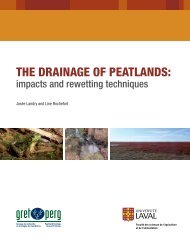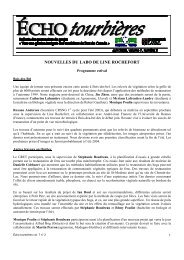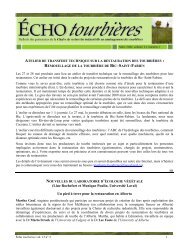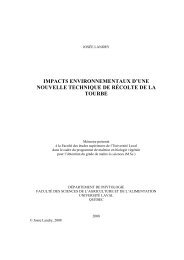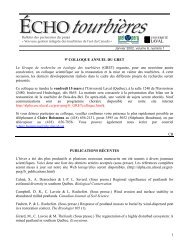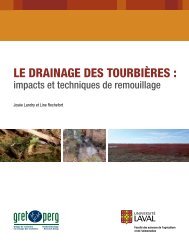wise use of mires and peatlands - Peatland Ecology Research Group
wise use of mires and peatlands - Peatland Ecology Research Group
wise use of mires and peatlands - Peatland Ecology Research Group
You also want an ePaper? Increase the reach of your titles
YUMPU automatically turns print PDFs into web optimized ePapers that Google loves.
VALUES AND CONFLICTS: WHERE DIFFERENT VALUES MEET113respecting the other’s position, - so long asthe positions do not fundamentally clash. Anatheist or agnostic without any religiousconviction can nevertheless accept thesanctity <strong>of</strong> a church or other place <strong>of</strong> worshipto avoid the suffering <strong>of</strong> religious believersshould the place <strong>of</strong> worship be violated.Moral pluralism allows that living decentlyinvolves many kinds <strong>of</strong> principles <strong>and</strong> varioussorts <strong>of</strong> responsibilities. It recognises thatfeelings <strong>and</strong> responses to situations aredrawn from many sources <strong>and</strong> cannot besimplified without distortion. “It remains truethat a pluralist perspective will not be easy to<strong>use</strong>. If many different sets <strong>of</strong> values are inplay when environmental issues are beingdiscussed, the role <strong>of</strong> the policy-makerbecomes much more complicated. But life iscomplicated, <strong>and</strong> we will not make progressin tackling the grave difficulties we face unlesswe learn to avoid shallow thinking <strong>and</strong> simplesolutions 151 .”4.10 NON-ANTHROPOCENTRICAPPROACHESThe non-anthropocentric approachesreferred to in the previous section are worthexploring further. They allow theinvestigation <strong>of</strong> alternative views in moralphilosophy <strong>and</strong> more extended valuesystems. These may add additionalsophistication to the discussion in thisdocument. The difficulty <strong>of</strong> motivatingpeople for sustainability, in the light <strong>of</strong>complex <strong>and</strong> unknown relations <strong>and</strong>discounting over time, may favour the <strong>use</strong> <strong>of</strong>non-anthropocentric positions, as an easyapproach 152 . Furthermore, the right to liveaccording to one’s own value system (Table4/1) implies that such positions have to beconsidered when brought forward in specificconflicts.Non-anthropocentric positions do notexclude human beings, but treat them as part<strong>of</strong> the elements under consideration. As anexample we present the moral philosophy <strong>of</strong>Martin Gorke 153 , one <strong>of</strong> the most extreme <strong>and</strong>most consistent forms <strong>of</strong> ecocentrism <strong>and</strong>holism 154 .Any moral position must be founded on aworld-view <strong>of</strong> certain basic, empiricallyderivedassumptions, e.g. on our knowledge<strong>of</strong> the position <strong>of</strong> human beings in theuniverse. Astronomy, evolutionary biology,<strong>and</strong> ecology show that humanity is neitherthe pivotal point nor the final end <strong>of</strong> the world.Nature, including inanimate nature, does notexist solely for human beings. If humanitycan no longer be seen as the centre <strong>of</strong> theworld, then ethical anthropocentrism must bequestioned: ethics can no longer be regardeda priori as something that is restricted torelationships between human beings.While the intrinsic value <strong>of</strong> non-humanentities is usually demonstrated by selectinga particular “decisive” quality (e.g. thecondition <strong>of</strong> having consciousness or that<strong>of</strong> being alive, cf. Table 3/1), Gorke starts froma different point <strong>of</strong> view. In his view we areforced, as a fundamental <strong>of</strong> morality, to makean “original decision” between two basicoptions: “egoism” <strong>and</strong> “a moral (i.e. nonegoist)st<strong>and</strong>point”. If one opts for the latter,any selection <strong>of</strong> entities not worthy <strong>of</strong> moralconsideration is an act <strong>of</strong> egoism, beca<strong>use</strong> Idetermine whom I will respect, when <strong>and</strong>under what circumstances. If having a moralst<strong>and</strong>point is taken seriously, moralconsideration has to be extended to all otherentities.Advocates <strong>of</strong> more restricted concepts <strong>of</strong>morality will object that it is by no meansegoism to exclude certain entities <strong>of</strong> naturefrom the moral community but simply a rational<strong>and</strong> objective assessment <strong>of</strong> circumstances.In Gorke’s analysis <strong>of</strong> the concept <strong>of</strong> morality,however, they carry the burden <strong>of</strong> pro<strong>of</strong>. Theymust convincingly demonstrate that the lack<strong>of</strong> certain qualities makes exclusionnecessary. Anthropocentrism, patho-


